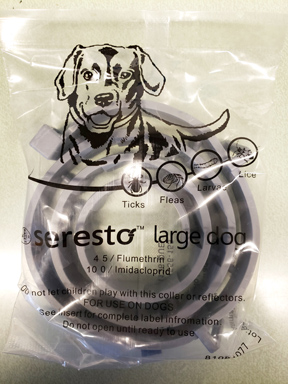!This story has an important update
Seresto

U.S. Customs and Border Protection photo
U.S. Customs and Border Protection officers at the Port of Pittsburgh seized 13 parcels containing counterfeit Seresto dog and cat flea collars, including this one, last May. Counterfeit collars might be responsible for some of the pet injuries reported by consumers.
Federal regulators are unable to say whether Seresto pet flea collars cited in tens of thousands of adverse incident reports are authentic product or knockoffs, according to information provided today by the U.S. Environmental Protection Agency.
"To date, EPA does not have any information about possible counterfeiting of Seresto collars," agency spokesperson Ken Labbe told the VIN News Service by email. "Generally, EPA is unable to draw conclusions on the legitimacy of a product from … incident reports."
The EPA replied to questions in the wake of a news report last week that the agency had received more than 75,000 consumer reports of adverse incidents among pets and people related to the popular flea and tick collar. The article, published March 2 by USA Today and the Midwest Center for Investigative Reporting, said Seresto collars were associated with nearly 1,700 pet deaths, tens of thousands of injured animals and hundreds of harmed humans.
Many veterinarians expressed skepticism about the story, saying incident reports alone fail to show the collars caused illness or disorders that could be attributable to various health conditions. Veterinary toxicologists interviewed by VIN News also speculated that counterfeit Seresto collars could be responsible for the wide range of negative effects reported by pet owners. The original news report did not mention the possibility of counterfeits.
Last year, U.S. Customs and Border Protection seized multiple shipments of counterfeit collars from mainland China and Hong Kong. CPB warned the public that fake collars "may consist of harmful ingredients that may sicken your pet, or they may cause chemical burns or hair loss."
Keri McGrath, a spokesperson for Elanco, which sells Seresto collars, said the company works hard to stamp out knockoffs but admitted that they persist and can be challenging to identify.
Dr. Tina Wismer, a veterinary toxicologist and medical director at the ASPCA Animal Poison Control Center, said counterfeit collars could account for the unexpected variety of signs reported by pet owners.
You do not have permission to view this document: [10147739]!
EPA's Labbe also confirmed that consumer reports present an incomplete picture of the effect of the collars, underscoring veterinarians' concerns that incident reports mistakenly were being interpreted as evidence of problems with the collars.
Some incidents are well investigated and reported in such a way as to establish a strong link between the adverse effect and the exposure, Labbe said. On the other hand, other reports do not include enough facts to clearly demonstrate causation. "Many of the reports are anecdotal, with no indication of whether the user followed label use instructions or used a product appropriate for the pet type and size," Labbe said. "Generally, there is no process for verifying the information in reports."
According to Labbe, the EPA cannot confirm or refute a claim in the March 2 article that Seresto collars have the highest number of incident reports of pet pesticide products or that the number of incident reports for Seresto is unusually high. "Other factors, such as number of units sold/used and whether a user applied the product in [the] manner directed on the label, would have to be factored into the equation," he said. "Raw numbers of incidents are not comparable across products."
March 19 update: The U.S. House Subcommittee on Economic and Consumer Policy called on Elanco this week to immediately temporarily recall the Seresto collar, and requested a variety of documents and information from the company, including consumer complaints related to harm to pets or people, internal communications about collar safety and sales volume. Elanco spokesperson Keri McGrath said the company will not recall the collars but will provide the requested information. The company released a statement outlining its reasons for staying the course.